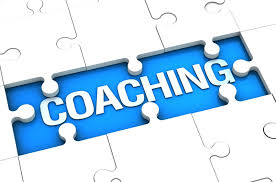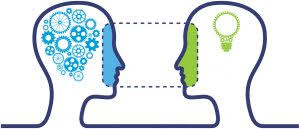Deciding to go ahead and have some coaching is a big decision, and then comes the next bit- deciding who will work for you as a Coach. These are a few of the typical questions that people consider when deciding whether a Coach is right for them.
What is coaching?
 Coaching is a form of learning where a coach supports a client to create learning and personal growth in a way that benefits them. Coaching is normally a series of conversations one person has with another. Julie Starr, a well-known coach, gives a good overall definition of coaching as “a conversation with a purpose, a space where someone can think through what is going on for them; the opportunity to do great thinking”.
Coaching is a form of learning where a coach supports a client to create learning and personal growth in a way that benefits them. Coaching is normally a series of conversations one person has with another. Julie Starr, a well-known coach, gives a good overall definition of coaching as “a conversation with a purpose, a space where someone can think through what is going on for them; the opportunity to do great thinking”.
Its worth mentioning briefly what coaching isn’t; it isn’t structured training (like classroom learning), and it isn’t counselling or psychotherapy. One of the principles of coaching is that people who come to see a Coach have innate resourcefulness, and its through the profound discussions that self-awareness and responsibility for actions going forward are felt by the client. That’s isn’t to say that that its all about the present and moving forward; sometimes its important to understand the past and why for example, a client might have repeated patterns of behaviours which aren’t helpful to them.
Why have coaching?
 People enlist the services of a coach because they want to improve their situation and achieve goals. They want to learn new ways of thinking and approaching situations. A coach uses a combination of observation, questioning, listening and feedback to create a conversation that’s rich in insight and learning. For the client they will experience a greater focus and attention that enables them to develop a greater awareness and appreciation of their own circumstances. In addition, they will also create new ways to resolve issues, produce better results and generally achieve their goals more easily.
People enlist the services of a coach because they want to improve their situation and achieve goals. They want to learn new ways of thinking and approaching situations. A coach uses a combination of observation, questioning, listening and feedback to create a conversation that’s rich in insight and learning. For the client they will experience a greater focus and attention that enables them to develop a greater awareness and appreciation of their own circumstances. In addition, they will also create new ways to resolve issues, produce better results and generally achieve their goals more easily.
Common benefits people experience from coaching include:
- Improved sense of direction and focus
- Increased knowledge of self/self-awareness
- Improved ability to relate to and influence others
- Increased motivation
- Improved personal effectiveness
- Increased resourcefulness/resilience, e.g., ability to handle change
What does the coaching journey look like?
 Most Coaches including myself offer some sort of (usually free) “chemistry session” to talk through the challenges the client wants to work with and how we might get on working together. I also take potential clients through some principles of contracting for the coaching; duration, confidentiality, costs and the like. I have a strong ethic of only taking on clients I really feel I can help.
Most Coaches including myself offer some sort of (usually free) “chemistry session” to talk through the challenges the client wants to work with and how we might get on working together. I also take potential clients through some principles of contracting for the coaching; duration, confidentiality, costs and the like. I have a strong ethic of only taking on clients I really feel I can help.
If we decide between us to go ahead, I encourage the client to create a coaching plan (even if its brief) setting out what they want from the coaching work; This very often changes as the work develops, but its important to set out initial goals, and I talk with the client frequently about how we are doing and measuring progress.
In terms of the length of the coaching work, whilst the requirements for each relationship are considered on a case-by-case basis, typically a coaching relationship lasts for 6-8 sessions over a 6-8-month period. Personally, I tend not to work with clients for less than 3-4 sessions as it takes time to get to know them and really get momentum in the work.
What can you expect from me?
 The role of a coach provides a kind of support distinct from any other. I focus solely on your situation with the kind of attention and commitment that you might rarely experience elsewhere.
The role of a coach provides a kind of support distinct from any other. I focus solely on your situation with the kind of attention and commitment that you might rarely experience elsewhere.
I will listen to you, with a genuine curiosity to understand who you are, what you think and feel and how you experience the world. I will look to reflect back to you, with the kind of objective assessment that creates real clarity. During conversations, I will encourage you to rise to challenges, overcome obstacles and look for active solutions
Because the relationship is based on trust and openness, the content of your discussions will be confidential. Where you have agreed through your line management or a third party that coaching would be helpful for you, I will agree with you the best way to keep them involved or updated and hold the confidentiality of the sessions.
What do you need to bring to coaching?
 I will encourage you to stay committed to the coaching process. That means showing up for face to face or virtual sessions, and keeping any agreements you make during sessions to follow up.
I will encourage you to stay committed to the coaching process. That means showing up for face to face or virtual sessions, and keeping any agreements you make during sessions to follow up.
I look for you to be open to the potential of coaching. That means contributing to conversations openly and honestly. For example, if something isn’t working, I need to know. If you have concerns or problems, voice them. If you know why a problem is occurring, say so. The strength and power of coaching relates strongly to the level of openness and trust between you and me.
For coaching to be successful you need to be motivated and committed to the coaching process by preparing for each session with:
- An idea of session objectives
- A de-brief of completed tasks and action plans (or obstacles that prevented completion)
- To be committed to coaching and to help the process with willingness to: be open-minded, to challenge yourself, to set goals and take action, to be persistent and to back yourself (with my support) to get results
How do you work out costs for the work?
 As an experienced and accredited Coach I keep an eye on the coaching market in terms of costs, and tend to be in the medium bracket of fees for the coaching work I offer.
As an experienced and accredited Coach I keep an eye on the coaching market in terms of costs, and tend to be in the medium bracket of fees for the coaching work I offer.
The professional coaching I provide for organisational clients is more than double the price of coaching work provided to private clients, a recognition of the costs that individuals have to pay out of their own pocket. Around 60% of my clients are private and I operate a variable approach to costs which allows me to charge private clients a lot less.